My videos and DVDs
 |
The BBC Complete Works of William
Shakespeare DVD BBC Shakespeare Complete Set All 37 plays in the BBC Shakespeare collection. Featuring some of the great actors of the 20th century. |
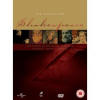 |
Shakespeare - The Collection Five features. In 'The Taming Of The Shrew' Elizabeth Taylor and Richard Burton star in this earthy, robust version of the classic Shakespeare comedy, which was director Franco Zeffirelli's first film. Michael York plays Lucentio, the young student who falls for comely Bianca (Natasha Pyne) and must recruit Petruchio (Burton) to wed her wild and violent older sister (Taylor) before their father will allow Bianca to entertain suitors. Watching two larger-than-life lovers like Burton and Taylor slug it out in their hilarious scenes of courtship is something even those with no fondness for Shakespeare can truly relish. Also includes: 'King Lear', 'Macbeth', 'Henry V', and 'Hamlet'. |
Individual Plays (film adaptations)As You Like It [2006] Other adaptationsShakespeare Re-told (BBC) Biographies, Background and other stuffIn Search of Shakespeare OtherNot Shakespeare, but related |
|
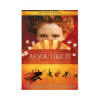 |
As You Like It [2006]
Amazon.co.uk Review If you think stuffy old Shakespeare could be livened up with some ninjas, Kenneth Branagh (Hamlet, Mary Shelley's Frankenstein) has heard your call. Adapter/director Branagh has set the pastoral comedy As You Like It in feudal Japan, where the characters are still British (they live in a community established by Western merchants) but now have reason to dress up in lush Japanese fabrics and engage in sumo wrestling. Due to a feud between two noble brothers, Rosalind (Bryce Dallas Howard, The Village) is banished and ends up disguised as a man in a nearby forest. There she tests the faith of her beloved (and also banished) Orlando (David Oyelowo, MI-5), who can't recognize her because she looks like a Dickensian ragamuffin. Meanwhile, a variety of other star-crossed lovers romp around the forest and zen gardens, sparring about love and melancholy. Branagh, never a subtle director, takes every opportunity to squeeze in slapstick and action (like the aforementioned ninjas), but he also keeps the language clear and the movie is beautiful to look at. The strong cast includes Kevin Kline (who previously frolicked in a movie adaptation of A Midsummer Night's Dream), Alfred Molina (Spider-Man 2, Frida), Romola Garai (I Capture the Castle, Dirty Dancing: Havana Nights), and Adrian Lester (Hustle, Love's Labors Lost). --Bret Fetzer |
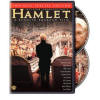 |
Hamlet (1997) Branagh Kenneth Branagh's four-hour production of Shakespeare's full text for Hamlet is visually lush (shot in 70mm, which is rarely done) and full of fascinating story moments that normally get cut from shorter stage versions. (Your idea of what kind of fellow Polonius is may change quite a bit.) The unexpurgated approach is truly enlightening, and Branagh intermittently succeeds at giving familiar moments in the drama an original cinematic spin, including Hamlet's spooky confrontation with his father's ghost (Brian Blessed). (Branagh also imposes some Hollywood glitter on the proceedings by casting the likes of Robin Williams, Billy Crystal, Charlton Heston and Jack Lemmon in the smaller parts.) The pre-Titanic Kate Winslet is very good as the doomed Ophelia, and Derek Jacobi delivers a wonderfully nuanced performance as Claudius, whose character is definitely filled out by the restored material. Branagh's own performance is a little revisionist--some viewers have quibbled with it while others seem fine. --Tom Keogh |
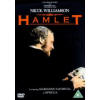 |
Hamlet (1969) Nicol Williamson Nicol Williamson's portrayal of Hamlet performed on both the London and Broadway stage is captured on film, bringing new life to William Shakespeare's classic play. in Shakespeare: The Collection |
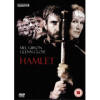 |
Hamlet Acclaimed director Franco Zeffirelli teamed with Mel Gibson for this energetic, earthy adaptation of the classic Shakespeare tragedy. From study abroad, the young Prince of Denmark returns home to find his mother has married his uncle, and his father's ghost is urging him to action; but what action? Gibson brings real gusto to Hamlet's anguish, and makes this full-blooded translation roar with life. Glenn Close, as his mother, and Helena Bonham Carter, as Ophelia, both lend excellent support. This is Shakespeare with teeth; it should please both students and casual filmgoers. |
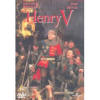 |
Henry V Very few first-time film directors would have been capable of making such a triumphant adaptation of Henry V; but a still-youthful Kenneth Branagh's years of stage experience paid off handsomely and his 1989 version qualifies as a genuine masterpiece, the kind of film that comes along once in a decade. He eschews the theatricality of Laurence Olivier's stirring, fondly remembered 1945 adaptation to establish his own rules: Branagh plays it down and dirty, seeing the Bard's play through revisionist eyes, framing it as an anti-war story in contrast to Olivier's patriotic spectacle. Branagh gives us harsh close-ups of muddied, bloody men, and of himself as Henry, his hardened mouth and wilful eyes revealing much about the personal cost of war. Not that the director-star doesn't provide lighter moments: his scenes introducing the French Princess Katherine (Emma Thompson) trying to learn English quickly from her maid are delightful. What may be the crowning glory of Branagh's adaptation comes when the dazed leader wanders across the battlefield, not even sure who has won. As King Hal carries a dead boy (a young Christian Bale) over the hacked bodies of both the English and French, a panorama of blood and mud and death greet the viewer as Branagh opens up the scene and Patrick Doyle's rousing hymn "Non nobis, Domine" provides marvellous counterpoint (like the director, the composer was another filmic first-timer). A more potent expression of the price of victory could scarcely be imagined. --Rochelle O'Gorman, Amazon.com in Shakespeare: The Collection |
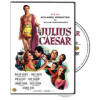 |
Julius Caesar (1953)
Amazon.co.uk Review
An examination of the relationship between political power and personal conscience, Joseph Mankiewicz's Julius Caesar is a solidly acted spectacle presented in classical, traditional form. Julius Caesar reveals its characters to be divided, complex, and contradictory--and therefore all the more human. The acting here is a veritable masterclass for aspiring thesps. As the opportunistic Marc Antony, Marlon Brando delivers the famous funeral speech with pure conviction, elsewhere casting an intense physicality that recalls his work as Stan in A Streetcar Named Desire. James Mason suggests a latent Hamlet in his turn as the honourable Brutus, while John Gielgud is positively serpentine as the lean, hungry Cassius. Louis Calhern invests Caesar with intelligence and edgy noir echoes carried over from his performance in The Asphalt Jungle (1950). Director Mankiewicz astutely balances the Renaissance view of Caesar as a power-obsessed, corrupt tyrant destined for punishment with modern suggestions that his murder may have been ill-advised. With its dark alleyways and complex hues of grey, this Julius Caesar at times owes more to Double Indemnity than Laurence Olivier. The director's scrupulous, pellucid pacing---supported in no small measure by Miklos Rozsa's stunning score--is the perfect complement for the screenplay's sophisticated, frieze-like structure. At film's end, power itself is without a master, and the spirit of Caesar has been left unrevived: and to Mankiewicz's credit, the latter is revealed to be the true tragedy of Julius Caesar.--Kevin Mulhall |
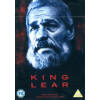 |
King Lear (Paul Scofield) Actors:
Paul Scofield in Shakespeare: The Collection
|
 |
Loves's Labour's Lost Having taken Shakespeare at his word on Hamlet (i.e., not cutting a single syllable out of a very long play), Kenneth Branagh selects a more radical approach with Love's Labour's Lost. Here the prolific director-star weeds out much of the play's dialogue, and adds songs and dances of a decidedly modern bent. The King of Navarre (Alessandro Nivola, Nicolas Cage's wacko brother in Face/Off) and his three comrades (Branagh, Matthew Lillard, Adrian Lester) take a vow: no womanly distractions while they pursue their studies. Ah, but at that very moment, floating down a magical studio-built river, is the queen of France (Alicia Silverstone), accompanied by three ladies-in-waiting. You do the maths. Branagh has set the tale on the eve of the Second World War, which allows for the inclusion of vintage pop songs, including "Cheek to Cheek", "The Way You Look Tonight" and a rousing chorus of "There's No Business Like Show Business", led by--who else?--Nathan Lane. The fact that most of the cast members are not accomplished song-and-dance folk is clearly meant to charm, but the results are spotty at best. Perhaps the most dynamic performer is Natascha McElhone (memorable from Ronin), whose aristocratic bearing and bottomless eyes lend a gravity to the material that is otherwise absent from Branagh's twinkly staging. The play contains some of Shakespeare's loveliest paeans to the language of love, yet Branagh seems to be in a hurry to juice everything up lest the audience lose interest. The labour shows. --Robert Horton |
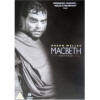 |
Macbeth (1948) Orson Welles Orson Welles' Macbeth is an expressionist masterpiece about a doomed man of ordinary ambition who believes an evil prophecy that he will become King. The shortest of Shakespeare's tragedies, Welles long considered Macbeth to be the most filmable of the Bard's work. Produced on a slim budget over a mere 32 days, the results are consistently impressive. As depicted by Welles, the title character is not a warrior king or conscience-stricken, poetic soul on a par with Hamlet; rather, he is revealed to be a facile, superstitious man consigned to fate even as the character does not trust to fate. For her part, Lady Macbeth (Jeanette Nolan) is merely obsessed with the unimpeded exercise of her will to power, viewing her husband's life as a tale told by an idiot (she is particularly effective during the "out, damned spot" scene from Act V). Welles has also created some new scenes here, conflating several characters into a "Holy Father" (Alan Napier) while eliciting strong supporting turns from actors such as Dan O'Herlihy (Macduff) and Roddy McDowall (Malcolm). All of this unfolds within a highly disordered state in which nature itself is on the rant ("Fair is foul and foul is fair"). Though the technically poor soundtrack and the occasional indecipherable Scottish brogue make the film seem a trifle compromised at times, each moment feels preternaturally alive. There is an almost Brechtian quality here, with Welles giving us splendid pieces then leaving it to us to fit them into a theatrically coherent puzzle. Refusing to believe that Birnham Wood could ever travel to Dunsinane, Macbeth is finally exposed as a man of insufficient character. As such, some might suggest that this Macbeth is more accurately described as the story of how Malcolm became King. --Kevin Mulhall DVD Description The Players:
|
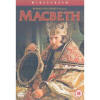 |
Macbeth (1971) Roman Polanski Amazon.co.uk Review Roman Polanski's adaptation of the Shakespearean tragedy Macbeth remains one of the most infamous for a number of reasons: the copious amounts of bloody gore, its expert use of location settings (filmed in North Wales) and Lady Macbeth's nude sleepwalking scene. Despite its notoriety, though, this does remain one of the more compelling film adaptations of the Scottish tragedy, if one of the more pessimistic takes on the story of Macbeth and his overreaching ambition. If you think the play is normally a bit of a downer, you haven't seen Polanski's bleak version of it, made in reaction to the murder of his wife, Sharon Tate, by the Manson "family". Jon Finch (Hitchcock's Frenzy) is a forceful Macbeth, bringing out the Scot's warrior instincts, and Francesca Annis is a memorable Lady Macbeth but the main thrust of the film belongs to Polanski's and noted British playwright and critic Kenneth Tynan's take on the play: extremely violent, nihilistic and visceral; this is down-in-the-dirt, no-holds-barred Shakespeare, not fussy costume drama. Pay close attention to the end, a silent coda that puts a chilling twist on all the action that has come beforehand and foreshadows more tragedy to come. --Mark Englehart |
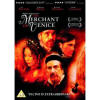 |
The Merchant of Venice Rarely has The Merchant of Venice, one of Shakespeare's most complex plays, looked as ravishingly sumptuous as in this adaptation, directed by Michael Radford (Il Postino). In a decadent version of renaissance Venice, a young nobleman named Bassanio (Joseph Fiennes, Shakespeare in Love) seeks to woo the lovely Portia (Lynn Collins), but lacks the money to travel to her estate. He seeks support from his friend, the merchant Antonio (Jeremy Irons); Antonio's fortune is tied up in sea ventures, so the merchant offers to borrow money from a Jewish moneylender, Shylock (Al Pacino). But Shylock holds a grudge against Antonio, who has routinely treated the Jew with contempt, and demands that if the debt is not repaid in three months, the price will be a pound of Antonio's flesh. The Merchant of Venice is famous as a "problem play"--the gritty matters of money lending and anti-Semitism sit uncomfortably beside the fairy tale elements of Portia and Bassanio's romance, and some twists of the plot can seem arbitrary or even cruel. The strength of Radford's intelligent and passionate interpretation is that he and the excellent cast invest the play's opposing facets with full emotional weight, thus making every question the play raises acute and inescapable. Irons is particularly compelling; kindness and blind prejudice sit side by side in his breast, rendering the clashes in his character as vivid as those in the play itself. --Bret Fetzer, Amazon.com |
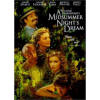 |
A Midsummer Night's Dream Amazon.co.uk Review By far the best thing about director Michael Hoffman's A Midsummer Night's Dream is the extraordinary all-star cast, which follows the precedent created by Kenneth Branagh's Italian-set romantic Shakespeare comedy, Much Ado About Nothing (1993), of mixing major Hollywood stars--here Kevin Kline and Michelle Pfeiffer--with top British talent, in this instance Christian Bale, Rupert Everett, Roger Rees, David Strathairn and Dominic West. Kline makes a fine Nick Bottom, with Pfeiffer equally good as the fairy queen Titania and Everett brooding effectively as Oberon. Unfortunately, while both look ravishing, it is hard to tell which actress between Anna Friel (Brookside) and Calista Flockhart (Ally McBeal) gives the most wretched performance. Both are completely out of their depth the moment they begin to speak, and utterly outclassed by the excellent Sophie Marceau. Shot in Tuscany and set in the 19th century, parts of the film are extraordinarily beautiful, while other sections could have benefited from some judicious special effects magic. This is not a bad movie, but it is rather uninspired, lacking any real imaginative grasp of the play. In contrast, the much less well known and lower budget Royal Shakespeare Company version of 1996 positively revels in the fantastically surreal possibilities this timeless text. --Gary S Dalkin
|
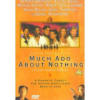 |
Much Ado About Nothing Kenneth Branagh's 1993 production of Shakespeare's Much Ado About Nothing is a vigorous and imaginative work, cheerful and accessible for everyone. Largely the story of Benedick (Branagh) and Beatrice (Emma Thompson)--adversaries who come to believe each is trying to woo the other--the film veers from arched wit to ironic romps, and the two leads don't mind looking a little silly at times. But the plot is also layered with darker matters that concern the ease with which men and women fall into mutual distrust. Branagh has rounded up a mixed cast of stage vets and Hollywood stars, among the latter Denzel Washington and Michael Keaton, the latter playing a rather seedy, Beetlejuice-like version of Dogberry, king of malapropisms.--Tom Keogh |
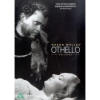 |
Othello (1952) Orson Welles The story of a man driven mad by the power of his self-contained emotion. A Shakespearean classic. Orson Welles' production began in 1948 but with money in short supply the production took a further four years to complete. An original negative found in 1992 allowed a restoration project to begin. Actors: Orson Welles, Suzanne Cloutier, Michael MacLiammoir, Robert Coote, Fay Compton
|
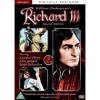 |
Richard III (1955) Laurence Olivier Amazon.co.uk Review The third and final entry in Laurence Olivier's Shakespeare triptych, Richard III is an audacious portrait of a man determined to prove himself a villain. A pure master of the political stage, Richard deploys a barrage of odious, unscrupulous traps in an attempt to exercise complete control over his rivals. As the personification of evil impudence, Olivier portrays the Duke of Gloucester with such aplomb that he even lures the audience on to his side. This is true even as Richard engineers plots to murder his brother Clarence (John Gielgud), betray his cousin Buckingham (Ralph Richardson) and seduce his niece Lady Anne (Claire Bloom). From the play's famous opening lines ("Now is the winter of our discontent"), Olivier delivers every speech with truly Machiavellian splendour. As usual, his voice is a force of nature--a full-bodied coloratura at one moment, an earthy baritone cello a few beats later. As a director, Olivier fully realises but underplays the corners of the script that most directors would hinge their dramatisation on. But he can also play it large: Olivier's superb staging of the climactic battle rivals his work on Henry V. Though Richard is finally brought down by the whispered curses of Queen Margaret, the audience exits feeling that the journey has been both entertaining and complete. Regrettably, this would be Olivier's last Shakespeare film, as a planned adaptation of Macbeth was abandoned for financial reasons. Olivier justly received an Oscar nomination for his performance; and believe it or not, this film was the inspiration for the original Blackadder! --Kevin Mulhall |
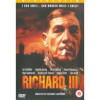 |
Richard III (1996) Ian McKellen Amazon.co.uk Review This film adaptation of a critically acclaimed stage production of Shakespeare's historical drama stars Ian McKellen in the title role. The setting is a comic-book vision of 1930s London: part art deco, part Third Reich, part industrial-age rust and rot. The play's force is turned into a synthetic high by art directors and storyboard sketchers, all of whom have a field day condensing the material into disposable pop imagery. Richard III is a fun film, more than anything, so infatuated with its own monstrous stitchery that even the most awkward casting (Annette Bening and Robert Downey Jr) seems a part of the ridiculous design. McKellen is the best thing about the movie, his mesmerising portrayal of freakish despotism and poisoned desire a thing to behold. --Tom Keogh |
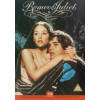 |
Romeo and Juliet (1968) Amazon.co.uk Review Franco Zeffirelli's 1968 adaptation of Shakespeare's Romeo and Juliet was unique in its day for casting kids in the play's pivotal roles of, well, kids. Seventeen-year-old Leonard Whiting and 15-year-old Olivia Hussey play the titular pair, the Bard's star-crossed lovers who defy a running feud between their families in order to be together in love. Typically played on stage and in previous film productions by adult actors, the innocent look and rawness of Whiting and Hussey resonated at the time with a burgeoning youth movement from San Francisco to Prague. The tragic romance at the centre of the story also clicked with anti-authority sentiments, but even without that, Zeffirelli scores points by validating the ideals and passions of strong-willed adolescents. Less successful are scenes requiring the actors to have a fuller grasp of the text, though the best thing going remains the unambiguous duel between Romeo and Tybalt (Michael York). Lavishly photographed by Pasquale de Santis on location in Italy, this Romeo and Juliet brought a different tone and dimension to a story that had become tiresome in reverential presentations. --Tom Keogh |
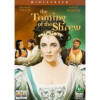 |
The Taming Of The Shrew [1967] Amazon.co.uk Review The 1967 Franco Zeffirelli film of The Taming of the Shrew had all the ingredients to make it a high point in Shakespearian cinema. In Richard Burton and Elizabeth Taylor it starred the most bankable couple in Hollywood history as the sparring leads in the Bard's quick-firing comic battle of the sexes; and in Zeffirelli, it had a director with a Shakespearian pedigree second to none. But the reality is that this is Burton's picture all the way. His Petruchio is a weighty performance of such intelligence that the whole film is thrown off-kilter whenever he is on screen and the other performers just can't keep up. Apart from Michael Hordern's wonderfully distracted Baptista, Burton is the only actor in total, effortless command of the language. Taylor's bosomy glamour and fiery spirit are ample compensations for her occasionally murderous treatment of Katharina's verse. Whether or not she is really tamed by the end is another matter: those legendary violet eyes suggest otherwise. Ultimately it's a rich, bawdy and colourful romp, with Burton at the peak of his powers. The DVD includes the theatrical trailer, a "making-of" featurette and filmographies. --Piers Ford in Shakespeare: The collection |
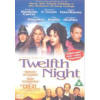 |
Twelfth Night Identical mixed-sex twins, separated during a shipwreck, both believe the other dead. When Viola dresses as her 'dead' brother for better protection, little does she realise that her living brother will be on the scene as well. Based on the William Shakespeare play, adapted for the screen by Trevor Nunn. |
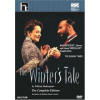 |
The Winters Tale [2005] The RSC's 1998/99 production of THE WINTER'S TALE, performed at the Barbican Theatre, London, is presented here for the first time in a complete and un-edited edition. This landmark production was hailed by critics and played to packed houses both in Stratford and London. Synopsis The full production staged at the Barbican by the Royal Shakespeare Company. 'The Winter's Tale' tells the story of Leontes, King of Sicilia, and is considered to be one of Shakespeare's most haunting plays. Review Greg Doran's TRIUMPHANT production Review A MASTERFUL version of one of the very greatest plays not to be missed. Sher's Leontes is a performance of overwhelming psychotic intensity. THRILLING. Review One of Sher's most intense, most fully achieved performances...its greatest subtly lies in portraying the side of Leontes that Leontes doesn t know. MAGNIFICENT...Doran and Jones BRILLIANT imagination. |
Other adaptations
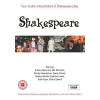 |
Shakespeare Re-told Four features. These adaptations inspired from the original plays bring Shakespeare's stories to the modern day audience. In 'Much Ado About Nothing', Beatrice and Benedick are two news presenters and ex-lovers who are reunited to present the same regional news programme. The friction in their relationship is almost palpable. Also includes 'Macbeth', 'The Taming Of The Shrew' and 'A Midsummer Night's Dream'. |
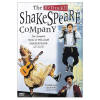 |
The Reduced Shakespeare Company: The Complete Works of William
Shakespeare Abridged [2000] Filmed in front of a live audience! The record breaking hit! All 37 Plays in 97 Minutes! Life is short. The complete works of Shakespeare are long. To the rescue: The Reduced Shakespeare Company, the three-man comedy troupe known for fast, funny, physical condensations of real serious stuff. They wrap up the Bards outsized oeuvre in 90 roller-coaster, rib tickling minutes. After warming up with a nothing-is-sacred send-up of Romeo and Juliet, they’re off, dispensing with the comedies in one fell swoop (because the tragedies are funnier). You see Othello as a rap song, Titus Andronicus as a cooking show, and the show’s unforgettable finale - Hamlet - told with the help of audience members and lascivious sock puppets. Warning!: This show is a high-speed roller-coaster type condensation of all of Shakespeare's plays, and is not recommended for people with heart ailments, bladder problems, inner-ear disorders and/or people inclined to motion sickness. The RSC cannot be held responsible for expectant mothers. |
Biographies, Background and other stuff |
|
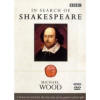 |
In Search of Shakespeare [2003] Amazon.co.uk Review The BBC series In Search of Shakespeare could be the English teacher's most important ally yet. With his typical mixture of intensive research, detective work, boyish enthusiasm and popular appeal, television historian Michael Wood comes closer than anyone to bringing the Bard to life. There are some astonishing discoveries along the way, which help to give a documentary cohesion to Shakespeare's story. But Wood is never arrogant enough to claim to have pinned the playwright's character down. The ifs, buts and maybes are all part of the fascination. The man himself remains tantalisingly just out of reach, which is probably as it should be. Instead, Wood takes us on an exhilarating journey through Elizabethan and Jacobean England, building a picture of his subject through painstaking reference to the climate of the age: a police state in which Shakespeare's family was devastated by the persecution of Catholics. Social, familial and political influences are all unravelled and pieced together, counterpointed with scenes from the plays--RSC actors conveniently to hand--and the life and times of the travelling actor and playwright are evoked in front of our eyes, becoming tangible and relevant. Wood gives us the chance to consider the plays in context, products of a great mind living in interesting times, rather than in academic isolation. It's a compelling tale, full of bloody danger, sex, celebrity and social history, and densely packed with layers of detail. Wood's great gift is to tell it in such an accessible way and without the sense of superiority that some of his peers bring to popular history. --Piers Ford
|
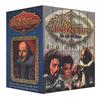 |
Will
Shakespeare (UK) "Life of Shakespeare" -1978
mini-series Tim Curry ... William Shakespeare Ian McShane ... Christopher Marlowe Nicholas Clay ... Earl of Southampton Paul Freeman ... Dick Burbage John McEnery ... Hamnet Sadler André Morell ... Edward Alleyn Simon Rouse ... Ingram Frizer John Normington ... Alex Cook Ron Cook ... Jack Rice Julian Curry ... Robert Cecil Darien Angardi ... Armin Patience Collier ... Queen Elizabeth Keith Baxter ... Earl of Essex Peter Benson ... Phipps Meg Wynn Owen ... Ann Shakespeare |
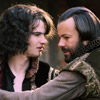 |
A Waste of Shame Drama about the passionate and destructive love triangle that consumed Shakespeare in his troubled middle years. |
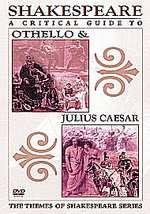 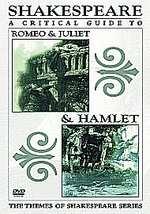 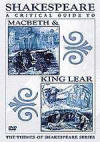 |
The themes of Shakespeare seriesHamlet : a critical guide [videorecording]. [U.K.] : Cromwell Films, 1997. 1 videocassette (30 min.). The themes of Shakespeare series Julius Caesar : a critical guide [videorecording]. [U.K.] : Cromwell Films, 1997. 1 videocassette (30 min.). The themes of Shakespeare series King Lear : a critical guide [videorecording]. [U.K.] : Cromwell Films, 1997. 1 videocassette (30 min.). The themes of Shakespeare series Macbeth : a critical guide [videorecording]. [U.K.] : Cromwell Films, 1997. 1 videocassette (30 min.). The themes of Shakespeare series Othello : a critical guide [videorecording]. [U.K.] : Cromwell Films, 1997. 1 videocassette (30 min.). The themes of Shakespeare series Romeo and Juliet : a critical guide [videorecording]. [U.K.] : Cromwell Films, 1997. 1 videocassette (30 min.). The themes of Shakespeare series |
Others |
|
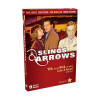 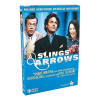 |
Slings and Arrows
Amazon.com The title of Slings and Arrows, like many of the themes and characters in this show, comes from Shakespeare’s Hamlet. It refers to “the slings and arrows of outrageous fortune” that the Danish prince suffers, leading him to question whether he is to be or not... you know. It’s a clever title for an inspired show about--what else?--the theatre. Set in the New Burbage Theatre Festival, a fictional Canadian Provincial theatre, a jaded, burnt-out artistic director, Oliver Welles (Stephen Ouimette), dies suddenly, and is replaced by a potential genius, his visionary protégé Geoffrey Tennant (Due South's Paul Gross). Geoffrey is legendary at the New Burbage for his awe-inspiring performance of Hamlet there years before, and also because he went mad and now his sanity seems to be hanging by a thread. And oh, by the way, Oliver’s still hanging around as a ghost, but Geoffrey’s the only one who can see him (sound familiar?), and his impulsive reactions and out-loud arguments with Oliver--including one captured while being interviewed for a news program--besides being hilarious, convince the cast and crews he’s really lost it. The show details the daily activities at the festival as they attempt to mount a new production of Hamlet (starring a movie star who’s all face and no talent), and in doing so it employs a huge cast of peripheral characters, including the dysfunctional acting company (rising star Rachel McAdams has a key part), scheming board members, and a neurotic theatre staff, each with their own little subplots interweaving to make one big drama. This first-season set of the Sundance Channel
program contains only six episodes, which is too bad because the
series is so excellent it’ll leave you wanting more. The fact
that shows of this caliber are rare makes it stand out all the
more. The writing is top-notch, with memorable dialogue, biting
dark humor, and clever situations that continually point out how
absurd real life can get. This one is a real gem, a show that
demonstrates ‘tis nobler in the mind to laugh at the slings and
arrows of outrageous fortune, rather than suffer them.
--Daniel Vancini |
Not Shakespeare, but related |
|
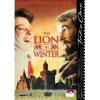 |
The Lion In Winter [1968] Amazon.co.uk Review In this 12th-century version of Who's Afraid of Virginia Woolf?, Henry II of England (Peter O'Toole) and his wife, Eleanor of Aquitaine (Katharine Hepburn), meet on Christmas Eve to discuss the future of the throne. These two are having slight marital problems, as she is kept in captivity most of the year for raising a rebellion against him, and he flaunts his young mistress. Then there are the problems raised by their three treacherous and traitorous sons. James Goldman won an Oscar for the brilliant screenplay, based on his Broadway play. It is a tad wordy, as the action is kept to a minimum, but those words are sharp as daggers. The humour is wicked and black and delivered with very dry, dead-on precision. Sparks fly and the screen sizzles whenever Hepburn and O'Toole tango, which is often. Both were nominated for Academy Awards for their vigorous performances. (She won, he didn't.) There is also an infamous homoerotic exchange between Philip of France (Timothy Dalton) and Richard the Lionhearted (Anthony Hopkins). Both actors were making their feature film debuts. --Rochelle O'Gorman, Amazon.com Synopsis Set over the Christmas of 1183, this classic of royal costume dramas concerns Henry II's effort to choose a worthy successor. Powerful Henry II (Peter O'Toole) favours his youngest son John (Nigel Terry), while his strong-willed wife Eleanor (Katherine Hepburn) feels the honour should be bestowed upon eldest son Richard the Lionhearted (Anthony Hopkins, in his screen debut). This disagreement leads the family to a war of wills that will stress every bond of love, trust, and honour. This acclaimed adaptation of James Goldman's play was also the first film for Timothy Dalton. Academy Award Nominations: 7, including Best Picture, Best Director, Best Actor--Peter O'Toole. Academy Awards: 3, including Best (Adapted) Screenplay, Best Actress--Katharine Hepburn (shared with Barbra Streisand for her role in Funny Girl). |
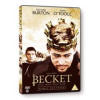 |
Becket [1964]
Product Description Becket is one of the great historical epics and features one of cinema's most legendary pairings - Richard Burton and Peter O'Toole. King Henry appoints his trusted companion to the esteemed position of Archbishop of Canterbury, believing his loyalty will give him control over the church. However, Becket takes his new duties seriously and his devotion to God soon brings him into direct conflict with the State and his lifelong friend. Recently rediscovered and beautifully restored Peter Glenville's lost masterpiece is available for the first time in almost 20 years. Synopsis Dramatic portrayal of the famous stage play about King Henry II's turbulent relationship with his Saxon friend Thomas a Becket. |
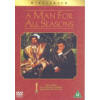 |
A Man For All Seasons [1966] Amazon.co.uk Review Robert Bolt's successful play, A Man for All Seasons, was not considered a hot commercial property by Columbia Pictures--a period piece about a moral issue without a star, without even a love story. Perhaps that's why Columbia left director Fred Zinnemann alone to make the film as long as he stuck to a relatively small budget. The results took everyone by surprise, as the talky morality play became a box-office hit and collected the top Oscars for 1966. At the play's heart is the standoff between King Henry VIII (Robert Shaw, in young lion form) and Sir Thomas More (Paul Scofield, in an Oscar-winning performance). Henry wants More's official approval of divorce, but More's strict ethical and religious code will not let him waffle. More's rectitude is a source of exasperation to Cardinal Wolsey (Orson Welles in a cameo), who chides, "If you could just see facts flat on without that horrible moral squint". Zinnemann's approach is all simplicity, and indeed the somewhat prosaic staging doesn't create a great deal of cinematic excitement. But the language is worth savouring, and the ethical politics are debated with all the calm and majesty of an absorbing chess game. --Robert Horton, Amazon.com |
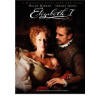 |
Elizabeth I [2005] (REGION 1) (NTSC)
Amazon.com Helen Mirren's Elizabeth I could almost be cousin to her Jane Tennison. Like the dedicated detective chief inspector, Queen Bess is not without a heart, but work comes first and any romantic entanglements are doomed to fail. Fortunately, she has her friendships. Directed by Tom Hooper (Prime Suspect 6), this two-part HBO/Channel 4 tele-film begins in 1579. The Virgin Queen has been on the throne for 20 years, but has not married. Her closest relationship is with Robert Dudley, the Earl of Leicester (Jeremy Irons), whom the council will not allow her to wed. Because Robert wishes to produce an heir, he marries another, garnering Elizabeth's disfavor (and nor is he all that thrilled about her dalliance with Henry, the Duke of Anjou). In time, he'll return to her good graces. As she explains, "Friendship outlasts love and is stronger than love." Then, as his health begins to fails, she'll turn to his stepson, the dashing, if duplicitous Robert Devereaux, the Earl of Essex (Hugh Dancy, the Hooper-directed Daniel Deronda). Meanwhile, Mary, Queen of Scots (Barbara Flynn) plots against her Protestant cousin. Even after Mary makes her exit, plenty of other powerful Catholics will stop at nothing to seize the crown. Marked as much by triumph as tragedy, the role of Elizabeth I has been catnip for many illustrious actresses, notably Bette Davis, Glenda Jackson, and Cate Blanchett. Mirren's multi-faceted portrayal of the queen's golden years is a worthy addition to that canon and Irons is a particularly formidable foil. --Kathleen C. Fennessy Product Description Helen Mirren and Jeremy Irons star in Elizabeth I, a two-part HBO Films miniseries event that explores the intersection of the private and public life of Elizabeth I (Mirren) in the latter half of her reign, offering a personal look at her allies, her enemies and her suitors as she struggles to survive in a male-dominated world. Part 1 explores Elizabeth's tempestuous relationship with the Earl of Leicester (Irons) as it survives a French suitor, war, treason, and illness. Part 2 follows Elizabeth through her later years, during which she had an equally passionate affair with the young, ambitious Earl of Essex (Hugh Dancy), who had been raised, ironically, by his stepfather Leicester. In the end, Elizabeth I sheds light on one of the most popular members of the monarchy who held absolute power over everything... except her heart. |